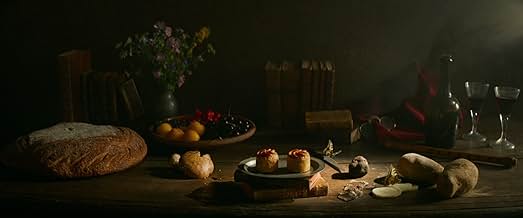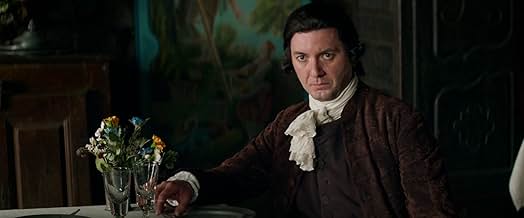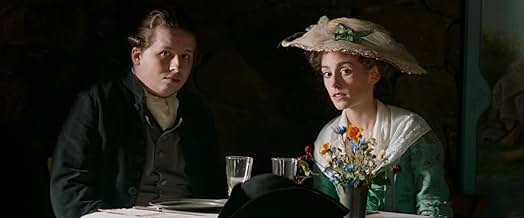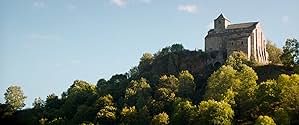AVALIAÇÃO DA IMDb
7,0/10
6,8 mil
SUA AVALIAÇÃO
França, 1789, pouco antes da Revolução. Com a ajuda de uma jovem surpreendente, um chef que foi despedido pelo seu mestre encontra a força para se libertar da sua posição de criado e abre o ... Ler tudoFrança, 1789, pouco antes da Revolução. Com a ajuda de uma jovem surpreendente, um chef que foi despedido pelo seu mestre encontra a força para se libertar da sua posição de criado e abre o seu primeiro restaurante.França, 1789, pouco antes da Revolução. Com a ajuda de uma jovem surpreendente, um chef que foi despedido pelo seu mestre encontra a força para se libertar da sua posição de criado e abre o seu primeiro restaurante.
- Direção
- Roteiristas
- Artistas
- Prêmios
- 3 indicações no total
- Direção
- Roteiristas
- Elenco e equipe completos
- Produção, bilheteria e muito mais no IMDbPro
Avaliações em destaque
Cinematography is the strongest aspect of this film. Some scenes look like paintings by Dutch Golden Age or Flemish Baroque artists. I had to pause several times to admire the tables tastefully laid with food. However, the main focus of the plot is not on food, like most of the reviewers seem to think. It shows the viewer why revolutions happen. Up until the rather stupid, highly unrealistic Hollywood-style happy ending. I guess the ending is the reason the film is listed as a comedy? Which it is not.
From the first scene I was delighted by the food and characters. While the movie moves forward you get more and more attached. It's a great, creative story. Contains love, passion and a great narrative.
Well shot, well acted, entertaining and will have you salivating. Please eat beforehand. Gets a bit ridiculous when going overboard with having LITERALLY EVERYTHING being invented by the two sidekicks, from menus to pommes frites to table service to desserts and cheese platters. But it's so engaging that it's easily overlooked.
A very nice and pleasant story that puts food and the love of cooking in marvelous light. Good acting, good visuals and some funny moments.
It's set in 1789 France just before the Revolution in a rural fictional dukedom of Chamfort. It tells the story of the invention of the modern restaurant concept in a time when only the nobility ate well.
Pierre Manceron (Grégory Gadebois) is the master chef for Le duc de Chamfort (Benjamin Lavernhe). Chamfort loves Manceron's cooking, but insists that he stick to set menus and not be creative in his recipes. When Manceron creates a little appetizer he calls "Délicieux" that contains potato, Manceron is dismissed after refusing to apologize for serving such a dish.
He returns to his rural home with his son, Benjamin (Lorenzo Lefèbvre), and together with an elderly mentor, Jacob (Christian Bouilette) runs a relay (postal) station that also serves basic food. Suddenly, a mysterious woman appears and asks to be Manceron's cooking apprentice. Louise (Isabelle Carré) claims to a former jam maker, but Manceron believes she actually must have been a prostitute. He refuses to accept her for a time, but ultimately agrees to train her.
They create dishes based on local produce and local livestock, and begin to attract a significant clientele. The duke is intrigued, misses his cook who he has not been able satisfactorily to replace, and offers to stop by for a traditional feast. If successful he'll invite Manceron back into service.
The film then takes a sharp departure into the pre-Revolution politics of the day, we learn the truth of Louise's background, and the story unfolds in unexpected ways.
This is beautifully-filmed movie. The scenes of food preparation reminded me of "Babette's Feast." The unfolding interaction between Manceron, Benjamin (who is pro-class struggle), and Louise is well done. The sharp departure two-thirds of the way into the movie started to to make it go off the rails for me. I expect minimal plausibility in historical films; this one drifted too far in its link to the French Revolution and ended somewhat unsatisfactorily.
Still, the cinematography and the initial storyline made it a good watch.
Pierre Manceron (Grégory Gadebois) is the master chef for Le duc de Chamfort (Benjamin Lavernhe). Chamfort loves Manceron's cooking, but insists that he stick to set menus and not be creative in his recipes. When Manceron creates a little appetizer he calls "Délicieux" that contains potato, Manceron is dismissed after refusing to apologize for serving such a dish.
He returns to his rural home with his son, Benjamin (Lorenzo Lefèbvre), and together with an elderly mentor, Jacob (Christian Bouilette) runs a relay (postal) station that also serves basic food. Suddenly, a mysterious woman appears and asks to be Manceron's cooking apprentice. Louise (Isabelle Carré) claims to a former jam maker, but Manceron believes she actually must have been a prostitute. He refuses to accept her for a time, but ultimately agrees to train her.
They create dishes based on local produce and local livestock, and begin to attract a significant clientele. The duke is intrigued, misses his cook who he has not been able satisfactorily to replace, and offers to stop by for a traditional feast. If successful he'll invite Manceron back into service.
The film then takes a sharp departure into the pre-Revolution politics of the day, we learn the truth of Louise's background, and the story unfolds in unexpected ways.
This is beautifully-filmed movie. The scenes of food preparation reminded me of "Babette's Feast." The unfolding interaction between Manceron, Benjamin (who is pro-class struggle), and Louise is well done. The sharp departure two-thirds of the way into the movie started to to make it go off the rails for me. I expect minimal plausibility in historical films; this one drifted too far in its link to the French Revolution and ended somewhat unsatisfactorily.
Still, the cinematography and the initial storyline made it a good watch.
Você sabia?
- CuriosidadesVery loosely based on true events as the first restaurants in France around 1789 emerged in Paris, not the countryside. Furthermore, the movie is not historically correct either by claiming that the first restaurant was created in France. The modern concept of a restaurant was already happening 600 years before in China circa 1100.
- Cenas durante ou pós-créditosAt the end of the credits, there is a short clip of a table, with two 'Delicious' set amidst items of food, flowers, wine, etc, while some butterflies flutter about.
Principais escolhas
Faça login para avaliar e ver a lista de recomendações personalizadas
- How long is Delicious?Fornecido pela Alexa
Detalhes
Bilheteria
- Orçamento
- € 5.000.000 (estimativa)
- Faturamento bruto mundial
- US$ 8.371.523
- Tempo de duração
- 1 h 52 min(112 min)
- Cor
- Proporção
- 2.39 : 1
Contribua para esta página
Sugerir uma alteração ou adicionar conteúdo ausente

































